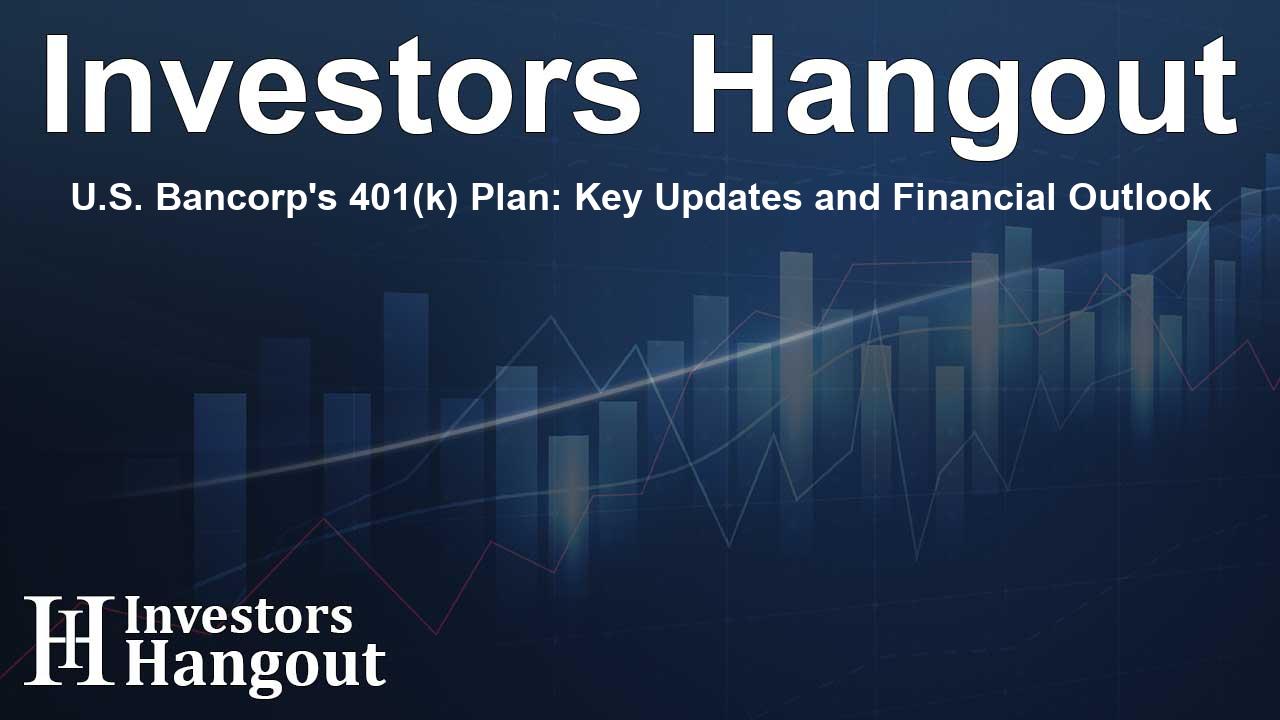U.S. Bancorp's 401(k) Plan: Key Updates and Financial Outlook

U.S. Bancorp Announces Upcoming 401(k) Blackout Period
U.S. Bancorp (NYSE: USB) has recently notified its executive officers and directors about a forthcoming blackout period for its employee 401(k) retirement plan. This period is set to begin soon, coinciding with a transition in the plan's management, including changes in recordkeeping and investment options.
The blackout period will last from December 24, 2024, through mid-January 2025. During this time, employees participating in the U.S. Bank 401(k) Savings Plan will face restrictions on several transactions. These restrictions include transferring assets between most funds, taking loans, distributing funds, and adjusting investments in the company's stock fund. Such measures are in alignment with the requirements of the Sarbanes-Oxley Act and SEC Regulation BTR.
To ensure fairness and transparency, the notification also pointed out that executive officers and directors will not be permitted to buy, sell, or transfer the company’s common stock during this blackout. This proactive measure helps to prevent insider trading and promotes ethical conduct regarding retirement investments.
U.S. Bancorp's Financial Health Amid Changes
Headquartered in Minneapolis, U.S. Bancorp is a prominent player in the financial services industry. The company highlights that updates regarding the exact timing of the blackout period will be shared freely with stockholders and interested parties. For any inquiries, the Corporate Secretary is available by mail or phone.
In recent developments, U.S. Bancorp has garnered attention in the market. Notably, analysts at Morgan Stanley have upgraded the stock from Equal Weight to Overweight, anticipating a significant increase in net interest margin by late 2025. This forecast positions U.S. Bancorp as a leading competitor in expanding profit margins compared to other major banks.
Shareholder Value and Stock Performance
As part of its ongoing commitment to shareholders, U.S. Bancorp has taken notable steps, including the issuance of $10 million in senior notes due in 2029 and the initiation of a $5 billion share repurchase program scheduled for early 2025. This strategic move is aimed at enhancing shareholder returns and confidence in the company’s performance.
Analyses from various firms, including Evercore ISI, Baird, and BofA Securities, indicate a stable outlook for U.S. Bancorp, with ratings ranging from In-Line to Buy. Furthermore, the bank recently announced a 2% increase in its quarterly dividend, reflecting a strong potential for growth in revenue and operational effectiveness.
Investing Insights and Market Position
As U.S. Bancorp navigates changes to its employee 401(k) plan, recent financial data bolsters its position in the banking landscape. With a market capitalization of $73.53 billion and a price-to-earnings ratio of 14.99, the bank demonstrates resilience and favorable valuation metrics.
The company’s dedication to enhancing shareholder value is evidenced by its impressive record of raising dividends for 13 consecutive years, maintaining consistent payments for over 54 years. Such commitment not only reflects financial stability but also a strong focus on the welfare of its employees and investors alike.
Additional measurements show a dividend yield of 4.24%, appealing to investors seeking income through dividends. Moreover, U.S. Bancorp's stock performance, with a remarkable one-year total return of 53.37%, showcases its standing despite challenging market conditions.
Unquestionably, these findings illustrate U.S. Bancorp’s dedication to both regulatory compliance and the interests of its shareholders, especially during significant transitions like the planned 401(k) blackout period. The company’s history of dividends, coupled with its strong market presence, positions it favorably for future growth and stability.
Frequently Asked Questions
What is the purpose of the upcoming 401(k) blackout period?
The blackout period allows for a smooth transition in managing the employee 401(k) plan, ensuring regulatory compliance and preventing insider trading.
How long will the blackout period last?
The blackout period will commence on December 24, 2024, and continue until mid-January 2025.
What transactions are restricted during the blackout?
Participants will not be able to transfer assets, take loans, obtain distributions, or modify investments in the company’s stock fund during this period.
How has U.S. Bancorp performed in the market recently?
U.S. Bancorp has seen a stock upgrade from analysts and has experienced significant stock performance, with a total one-year return of 53.37%.
What measures is U.S. Bancorp taking to enhance shareholder value?
The company has initiated a $5 billion share repurchase program and increased its dividend by 2%, demonstrating its commitment to boosting shareholder returns.
About The Author
Contact Olivia Taylor privately here. Or send an email with ATTN: Olivia Taylor as the subject to contact@investorshangout.com.
About Investors Hangout
Investors Hangout is a leading online stock forum for financial discussion and learning, offering a wide range of free tools and resources. It draws in traders of all levels, who exchange market knowledge, investigate trading tactics, and keep an eye on industry developments in real time. Featuring financial articles, stock message boards, quotes, charts, company profiles, and live news updates. Through cooperative learning and a wealth of informational resources, it helps users from novices creating their first portfolios to experts honing their techniques. Join Investors Hangout today: https://investorshangout.com/
The content of this article is based on factual, publicly available information and does not represent legal, financial, or investment advice. Investors Hangout does not offer financial advice, and the author is not a licensed financial advisor. Consult a qualified advisor before making any financial or investment decisions based on this article. This article should not be considered advice to purchase, sell, or hold any securities or other investments. If any of the material provided here is inaccurate, please contact us for corrections.
